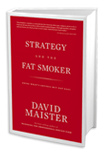David Maister’s Strategy & the Fat Smoker
As the title of David Maister’s forthcoming book Strategy and the Fat Smoker suggests, the problem isn’t that we don’t know what to do, it’s that we know and choose to ignore. Based on a series of articles written and posted online, Maister’s latest offering promises a dose of “real” strategy: “Real strategy lies not in figuring out what to do, but in devising ways to ensure that, compared top others, we actually do more of what everybody knows they should do.” In other words, it’s all about implementation, and that’s the focus of the book. Organized in sections pertaining to how organizations should think about strategy, clients (including marketing and selling), and management, Strategy and the Fat Smoker speaks to those who understand that knowing without doing brings little value.
I began by reading the introductory chapters on strategy. Several gems leapt out at me, including:
If you truly want to succeed (and many people do not want it badly enough to make it happen) then you must never settle, never give up, never coast, never just accept what is, even if you are currently performing at a high level.
and
[T]he primary outcome of strategic planning should not be analytical insight or smart choices, but a superior resolve to accomplish something.
and
The best way to approach this re-evaluation [of the organization’s purpose, mission, vision and values] is to begin with a very small inner circle of top management leaders, who can look each other in the eyes and ask: “Are these really the decision rules we as leaders are prepared to stick with?”
Maister invites readers to plunge in with any chapter, and after I got the flavor of his approach to strategy, I dived into Chapter 17: The Trouble with Lawyers. Maister’s preface to this chapter indicates that he originally wrote it to explain “why lawyers and law firms are different from other professions” but that others in consulting and the financial services industry identify with the culture and behavior that Maister ascribes to the legal profession. Almost any lawyer who reads this chapter will recognize that Maister is indeed speaking to us. He highlights four problems that prevent “lawyers from effectively functioning in groups:”
* problems with trust;
* difficulties with ideology, values, and principles;
* professional detachment; and
* unusual approaches to decision making (referring to lawyers’ propensity to attack any idea presented to locate and highlight its weaknesses, with the result that “within a short time, most ideas, no matter who initiates them, will be destroyed, dismissed, or postponed for future examination.”)
Having identified and explained these pecularities, Maister asks why lawyers do so well financially if the profession is riddled with these problems, and his answer is proven by the lockstep approach that firms tend to apply to innovation:
The greatest advantage lawyers have is that they compete only with other lawyers. If everyone else does things equally poorly, and clients and recruits find little variation between firms, even the most egregious behavior will not lead to a competitive disadvantage.
Maister suggests that only client pressure is likely to compel firms to begin to act “as firms — delivering seamless service, practice areas that have depth ( and not just a collection of individualistic stars), and true, cross-boundary teamwork.” Having come to understand some of the problems that have so far prevented that will help firms to adapt as such client pressure is applied.
Other chapters of Strategy and the Fat Smoker have application to lawyers and firms as well. The book does an excellent job of delivering its subtitled promise of teaching organizations and individuals to do “what’s obvious but not easy.” It’s readable, practical, and insightful. The release date is January 2, 2008, which is perfect timing. Buy it, read it, and learn how to make your resolutions (and those of your organization) come to pass in 2008.




Thanks for the wonderful review – I appreciate your support (and your own stimulating writing) David